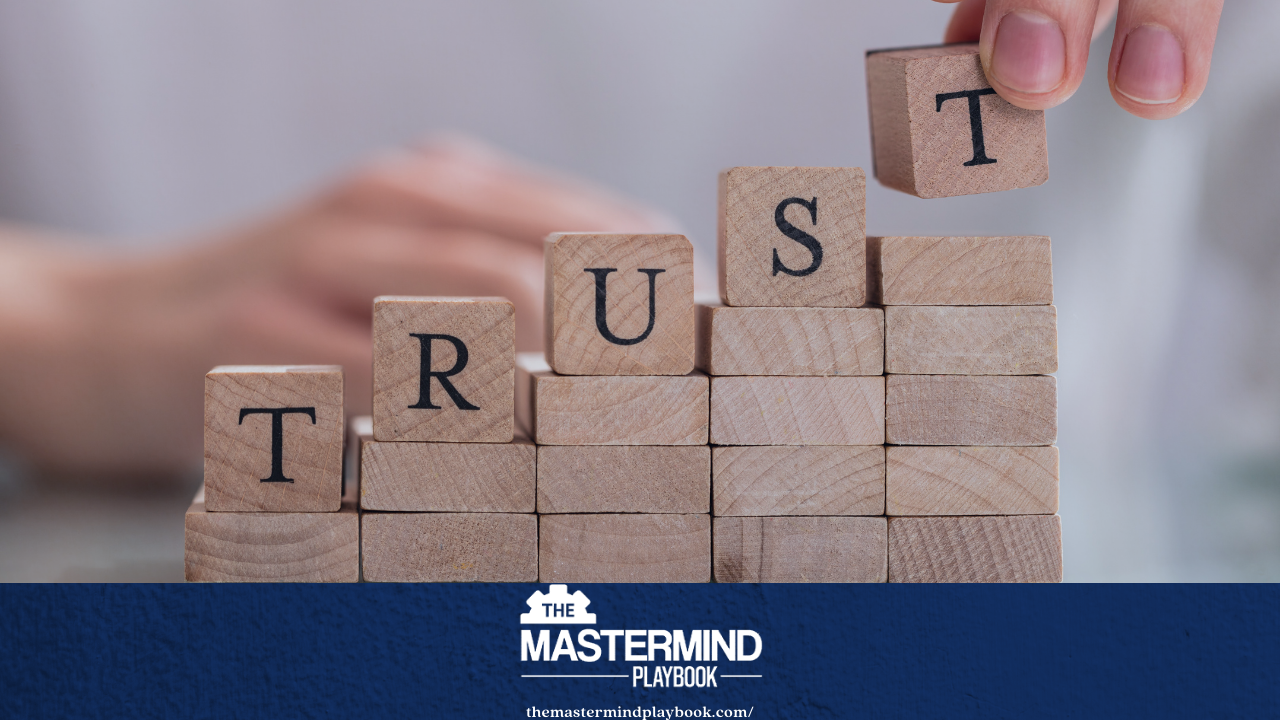No More Burning Bridges You Didn’t Know About: Here Are Our Top 3 Ways to Build Trust Quick

Building a trustworthy relationship with others requires several components, including consistency, open communication, honesty, and most importantly, staying true to your word. Trust can be difficult to build, but it’s easy to crack.
To demonstrate to your investors, friends, or family that you’ll do what you say… practice what you preach. This will also create a foundation of trust for future business or personal relationships by demonstrating examples of past relationships you’ve pursued with consistency and trust. No one wants to befriend or invest in someone with a history of cheating, lying, or making crooked deals.
But you might be wondering... how do I prove to people that I’m trustworthy? The answer is simple: continue to stick to your word. Having a good reputation will proceed you. However, there are a few strategies you can use to build trust with someone quickly. Here are my top three tips to build trust quick.
-
Stick to Your Commitments
Easier said than don...
“The Industry is Too Saturated!”: How to Use Your Skills and Talents to Stay Relevant

Are you relevant? Do you consider yourself capable? Are you constantly striving to grow and stay involved in continuous education? If so, odds are you’d be credible for any new task that presents itself in your field. If not, you may need to reassess. According to Stephen M. R. Covey in The Speed of Trust, “The first dimension of competence is capabilities—the talents, skills, knowledge, capabilities, and abilities we have that enable us to perform with excellence.”
Capable people are credible. It’s that simple. For example, when you apply for a job the first thing the employer wants to see is your resume—to see if you possess the qualifications or capabilities of performing the tasks necessary for the position. Employers want to see that you have the ability to be disciplined, committed, and task-oriented. Another example of this is seen in the amount of trust we place in children based on their accomplishments.
When a child learns to play an instrument, gets stellar grades ...
The Secret to Being the BEST Mastermind Leader: How to Improve Your Communication with the Art of Clear Expectations

Communication forms the backbone of every business and relationship. Without communication, there is no means of trust, expectation, or execution. Communication is mandatory for any successful business or partnership to continue. Unfortunately, most Mastermind leaders talk... but they don’t communicate what they actually mean.
In the book The Speed of Trust, Stephen M. R. Covey shares a story about a miscommunication between his wife and his daughter. Stephen's wife, Jeri, told their 16 year old daughter that she wasn’t allowed to go out with her friends that night unless she cleaned her room and her bathroom.
Later, after their daughter had left for a dance, Jeri checked her room and bathroom and exclaimed, “McKinlee is grounded! She broke a commitment!” upon realizing the rooms weren’t clean. Stephen then proceeded to call McKinlee to tell her she had to come home and clean her room and the bathroom.
McKinlee insisted that she did clean the rooms, to which Stephen re...
Top 5 Things for Mastermind Leaders to be Thankful For This Year

2021 was an unprecedented year for everyone—especially business owners. When faced with uncertainty, we all have the opportunity to be negative or get innovative. As we’ve never faced a global pandemic in this day and age, there’s no rule book to follow. This could be taken as a means of defeat, or an opportunity to make your own rules.
If you’ve made it this far in the year, odds are, you chose the latter. That victory on its own is worth celebration! Unfortunately, many business owners struggle with celebrating little wins—such as persevering through hard business decisions. Considering it was undoubtedly one of the most difficult years to survive in business, this was no small feat.
If you’re struggling with seeing the silver lining through this year’s trials and tribulations, you might just need to get more granular. Maybe this wasn’t your best year for sales, your best year for growth, and you didn’t reach every number you had predicted pre-pandemic. But you likely accomplish...
3 Keys For Mastermind Leaders to Develop Self-Trust

In The Speed of Trust, Stephen M.R. Covey argues that businesses and organizations can only move at the rate equal to their members’ trust in each other—and themselves.
I reckon, he’s correct!
I’ve had the misfortune of working in organizations that had low trust. Sometimes colleagues didn’t trust one another due to fierce competition and unbalanced incentives. Other times, there was low trust between managers and subordinates due to harsh micromanagement—or a lack of strong guidance.
In these environments, everyone watches their own back. And all that time looking backward means we had no time to look—and move—forward.
Therefore, any organization that desires to see its vision fulfilled has to work on its trust. This trust tends to flow from the top down rather than the bottom up, because of the natural balance of power between executives, managers, and employees.
This is especially true of mastermind groups which are known for their big vision and vulnerability...
The Secrets to Building Trust in a Mastermind Group

Many different components go into running a successful mastermind group, but trust has to rank as the highest on the list. Trust forms the basis of authentic communication and relationship building. Without it, we have nothing.
As a mastermind leader, the onus falls on you to build trust with and between your members. However, we have many myths about trust running rampant in our culture.
Perhaps the most misguided myth is that trust takes a long time to earn. While this certainly can be true in some cases, it isn’t true if you have the tools and mindsets at your disposal to inspire trust in others. I’ll detail some of these tools as well as some general principles that will help take your mastermind group to the next level.
The first step in building trust with others is to establish self-trust. Trusting yourself means having the integrity to “walk your talk” and stand behind your principles. To develop self-trust, you must be honest, meaning that you always tell the t...
How You Can Use the Connection Effect to Change the Lives of your Mastermind Group Members

If you ask an older adult about their greatest regrets, they’ll probably tell you they regret not spending more time with loved ones, and spending too much time on work. As they near the end of their lives, they attest more and more that relationships matter most. And yet so many of us remain focused on professional goals rather than the relationships closest to us. Hopefully, we can learn from the regrets of others and embrace the power of relationships now as one of the most important aspects of a life well-lived. This is especially important for leaders of mastermind groups as they help each member become the best and most fully realized version of themselves.
In Western culture, we are often taught to overlook the importance of family, friendships, and relationships because of the emphasis placed on individual growth towards material success. Our education system focuses on accumulating knowledge and skills that you can apply to your career. However, students are rarely taught ...
Why You Should Cultivate Trust Among Your Mastermind Members

Trust forms the foundation for meaningful interpersonal relationships and organizational cohesion. Individuals who trust each other form bonds, cooperate, and work harmoniously towards a common objective. Conversely, a lack of trust between individuals causes power struggles, selfishness, and bitterness. As a result, individuals who don’t trust each other are less productive, less moral, and less motivated. This is not the outcome any of us want for our relationships!
This same dynamic also applies to groups. In fact, the effects of distrust become amplified when it comes to collectives and organizations. That is because a lack of trust amongst individuals in a group can lead to a culture of distrust which fosters infighting, ego gratification, and aggression. Thus an unhealthy environment breeds greater toxicity. This isn’t always the case, but it’s definitely the norm.
In this sense, you can consider the culture of a group or organization as an economy of trust, in which g...
How You Can Use the Connection Effect to Change the Lives of your Mastermind Group Members

If you ask an older adult about their greatest regrets, they’ll probably tell you they regret not spending more time with loved ones, and spending too much time on work. As they near the end of their lives, they attest more and more that relationships matter most. And yet so many of us remain focused on professional goals rather than the relationships closest to us. Hopefully, we can learn from the regrets of others and embrace the power of relationships now as one of the most important aspects of a life well-lived. This is especially important for leaders of mastermind groups as they help each member become the best and most fully realized version of themselves.
In Western culture, we are often taught to overlook the importance of family, friendships, and relationships because of the emphasis placed on individual growth towards material success. Our education system focuses on accumulating knowledge and skills that you can apply to your career. However, students are rarely taug...
Why Mastermind Leaders Should Apprentice Under Jesus

One of the most important parts of being an effective mastermind facilitator is to lead by example. Your members will look to you not just for guidance and support, but also for a mentor and role model. You should always remain aware of this: your members are observing your behavior and taking notice of your virtues and vices.
This is not to say that you shouldn’t have any character flaws. That would be impossible. Instead, you should do your best to understand and acknowledge your flaws and practice self-awareness. Your members will appreciate your vulnerability and transparency about your shortcomings. They’ll feel inspired to work and improve upon their own flaws.
We all learn behaviors and values from others. As a mastermind leader, you should be aware that many of your members are apprenticing under you. Moreover, you should apprentice under spiritual visionaries like Jesus. If this idea sounds familiar, that is because John Mark Comer talked about it extensively in h...

